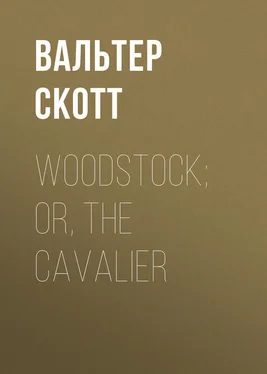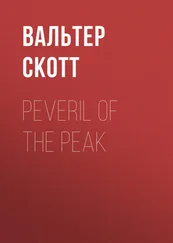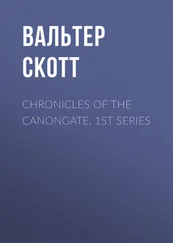Вальтер Скотт - Woodstock; or, the Cavalier
Здесь есть возможность читать онлайн «Вальтер Скотт - Woodstock; or, the Cavalier» — ознакомительный отрывок электронной книги совершенно бесплатно, а после прочтения отрывка купить полную версию. В некоторых случаях можно слушать аудио, скачать через торрент в формате fb2 и присутствует краткое содержание. Жанр: foreign_antique, foreign_prose, Альтернативная история, на английском языке. Описание произведения, (предисловие) а так же отзывы посетителей доступны на портале библиотеки ЛибКат.
- Название:Woodstock; or, the Cavalier
- Автор:
- Жанр:
- Год:неизвестен
- ISBN:нет данных
- Рейтинг книги:5 / 5. Голосов: 1
-
Избранное:Добавить в избранное
- Отзывы:
-
Ваша оценка:
- 100
- 1
- 2
- 3
- 4
- 5
Woodstock; or, the Cavalier: краткое содержание, описание и аннотация
Предлагаем к чтению аннотацию, описание, краткое содержание или предисловие (зависит от того, что написал сам автор книги «Woodstock; or, the Cavalier»). Если вы не нашли необходимую информацию о книге — напишите в комментариях, мы постараемся отыскать её.
Woodstock; or, the Cavalier — читать онлайн ознакомительный отрывок
Ниже представлен текст книги, разбитый по страницам. Система сохранения места последней прочитанной страницы, позволяет с удобством читать онлайн бесплатно книгу «Woodstock; or, the Cavalier», без необходимости каждый раз заново искать на чём Вы остановились. Поставьте закладку, и сможете в любой момент перейти на страницу, на которой закончили чтение.
Интервал:
Закладка:
"I meant no harm," answered the keeper, suppressing his disposition to make a harsher reply. "My business is with bolts and bucks, not with titles and state affairs. But yet, whatever may have happed since, that poor King was followed with blessings enough from Woodstock, for he left a glove full of broad pieces for the poor of the place" —
"Peace, friend," said the Independent; "I will think thee else one of those besotted and blinded Papists, who hold, that bestowing of alms is an atonement and washing away of the wrongs and oppressions which have been wrought by the almsgiver. Thou sayest, then, these were the apartments of Charles Stewart?"
"And of his father, James, before him, and Elizabeth, before him , and bluff King Henry, who builded that wing, before them all."
"And there, I suppose, the knight and his daughter dwelt?"
"No," replied Joceline; "Sir Henry Lee had too much reverence for – for things which are now thought worth no reverence at all – Besides, the state-rooms are unaired, and in indifferent order, since of late years. The Knight Ranger's apartment lies by that passage to the left."
"And whither goes yonder stair, which seems both to lead upwards and downwards?"
"Upwards," replied the keeper, "it leads to many apartments, used for various purposes, of sleeping, and other accommodation. Downwards, to the kitchen, offices, and vaults of the castle, which, at this time of the evening, you cannot see without lights."
"We will to the apartments of your knight, then," said the Independent.
"Is there fitting accommodation there?"
"Such as has served a person of condition, whose lodging is now worse appointed," answered the honest keeper, his bile rising so fast that he added, in a muttering and inaudible tone, "so it may well serve a crop-eared knave like thee."
He acted as the usher, however, and led on towards the ranger's apartments.
This suite opened by a short passage from the hall, secured at time of need by two oaken doors, which could be fastened by large bars of the same, that were drawn out of the wall, and entered into square holes, contrived for their reception on the other side of the portal. At the end of this passage, a small ante-room received them, into which opened the sitting apartment of the good knight – which, in the style of the time, might have been termed a fair summer parlour – lighted by two oriel windows, so placed as to command each of them a separate avenue, leading distant and deep into the forest. The principal ornament of the apartment, besides two or three family portraits of less interest, was a tall full-length picture, that hung above the chimney-piece, which, like that in the hall, was of heavy stone-work, ornamented with carved scutcheons, emblazoned with various devices. The portrait was that of a man about fifty years of age, in complete plate armour, and painted in the harsh and dry manner of Holbein – probably, indeed, the work of that artist, as the dates corresponded. The formal and marked angles, points and projections of the armour, were a good subject for the harsh pencil of that early school. The face of the knight was, from the fading of the colours, pale and dim, like that of some being from the other world, yet the lines expressed forcibly pride and exultation.
He pointed with his leading-staff, or truncheon, to the background, where, in such perspective as the artist possessed, were depicted the remains of a burning church, or monastery, and four or five soldiers, in red cassocks, bearing away in triumph what seemed a brazen font or laver. Above their heads might be traced in scroll, " Lee Victor sic voluit ." Right opposite to the picture, hung, in a niche in the wall, a complete set of tilting armour, the black and gold colours, and ornaments of which exactly corresponded with those exhibited in the portrait.
The picture was one of those which, from something marked in the features and expression, attract the observation even of those who are ignorant of art. The Independent looked at it until a smile passed transiently over his clouded brow. Whether he smiled to see the grim old cavalier employed in desecrating a religious house – (an occupation much conforming to the practice of his own sect) – whether he smiled in contempt of the old painter's harsh and dry mode of working – or whether the sight of this remarkable portrait revived some other ideas, the under-keeper could not decide.
The smile passed away in an instant, as the soldier looked to the oriel windows. The recesses within them were raised a step or two from the wall. In one was placed a walnut-tree reading-desk, and a huge stuffed arm-chair, covered with Spanish leather. A little cabinet stood beside, with some of its shuttles and drawers open, displaying hawks-bells, dog-whistles, instruments for trimming falcons' feathers, bridle-bits of various constructions, and other trifles connected with silvan sport.
The other little recess was differently furnished. There lay some articles of needle-work on a small table, besides a lute, with a book having some airs written down in it, and a frame for working embroidery. Some tapestry was displayed around the recess, with more attention to ornament than was visible in the rest of the apartment; the arrangement of a few bow-pots, with such flowers as the fading season afforded, showed also the superintendence of female taste.
Tomkins cast an eye of careless regard upon these subjects of female occupation, then stepped into the farther window, and began to turn the leaves of a folio, which lay open on the reading-desk, apparently with some interest. Joceline, who had determined to watch his motions without interfering with them, was standing at some distance in dejected silence, when a door behind the tapestry suddenly opened, and a pretty village maid tripped out with a napkin in her hand, as if she had been about some household duty.
"How now, Sir Impudence?" she said to Joceline in a smart tone; "what do you here prowling about the apartments when the master is not at home?"
But instead of the answer which perhaps she expected, Joceline Joliffe cast a mournful glance towards the soldier in the oriel window, as if to make what he said fully intelligible, and replied with a dejected appearance and voice, "Alack, my pretty Phoebe, there come those here that have more right or might than any of us, and will use little ceremony in coming when they will, and staying while they please."
He darted another glance at Tomkins, who still seemed busy with the book before him, then sidled close to the astonished girl, who had continued looking alternately at the keeper and at the stranger, as if she had been unable to understand the words of the first, or to comprehend the meaning of the second being present.
"Go," whispered Joliffe, approaching his mouth so near her cheek, that his breath waved the curls of her hair; "go, my dearest Phoebe, trip it as fast as a fawn down to my lodge – I will soon be there, and" —
"Your lodge, indeed" said Phoebe; "you are very bold, for a poor kill-buck that never frightened any thing before save a dun deer — Your lodge, indeed! – I am like to go there, I think." "Hush, hush! Phoebe – here is no time for jesting. Down to my hut, I say, like a deer, for the knight and Mrs. Alice are both there, and I fear will not return hither again. – All's naught, girl – and our evil days are come at last with a vengeance – we are fairly at bay and fairly hunted down."
"Can this be, Joceline?" said the poor girl, turning to the keeper with an expression of fright in her countenance, which she had hitherto averted in rural coquetry.
"As sure, my dearest Phoebe, as" —
The rest of the asseveration was lost in Phoebe's ear, so closely did the keeper's lips approach it; and if they approached so very near as to touch her cheek, grief, like impatience, hath its privileges, and poor Phoebe had enough of serious alarm to prevent her from demurring upon such a trifle.
Читать дальшеИнтервал:
Закладка:
Похожие книги на «Woodstock; or, the Cavalier»
Представляем Вашему вниманию похожие книги на «Woodstock; or, the Cavalier» списком для выбора. Мы отобрали схожую по названию и смыслу литературу в надежде предоставить читателям больше вариантов отыскать новые, интересные, ещё непрочитанные произведения.
Обсуждение, отзывы о книге «Woodstock; or, the Cavalier» и просто собственные мнения читателей. Оставьте ваши комментарии, напишите, что Вы думаете о произведении, его смысле или главных героях. Укажите что конкретно понравилось, а что нет, и почему Вы так считаете.












